#decentralizedapplications
Explore tagged Tumblr posts
Text
𝐄𝐱𝐩𝐥𝐨𝐫𝐢𝐧𝐠 𝐭𝐡𝐞 𝐈𝐧𝐭𝐞𝐫𝐬𝐞𝐜𝐭𝐢𝐨𝐧 𝐨𝐟 𝐏𝐨𝐥𝐤𝐚𝐝𝐨𝐭, 𝐍𝐞𝐚𝐫 𝐏𝐫𝐨𝐭𝐨𝐜𝐨𝐥, 𝐚𝐧𝐝 𝐂𝐮𝐭𝐭𝐢𝐧𝐠-𝐄𝐝𝐠𝐞 𝐑𝐞𝐬𝐞𝐚𝐫𝐜𝐡
WebAssembly (WASM) is transforming the way developers approach web development and decentralized applications. With its promise of speed and scalability combined with the robustness of blockchain technology, WASM has become a vital tool in the ecosystems of Polkadot and Near Protocol—two of the most innovative platforms today. This blog post will examine how WASM is applied within these technologies, backed by statistical insights, research findings, and expert opinions.
The Rise of WebAssembly
WebAssembly, or WASM, is a binary instruction format that enables code execution on web browsers at nearly native speed. Since its introduction, WASM has seen rapid adoption across blockchain technologies. A report by the W3C states that more than 90% of modern web browsers now support WASM, leading to an upswing in its usage.
Research published in Blockchain Technology found that utilizing WASM can enhance the performance of decentralized applications (DApps) by anywhere from 10% to 20% compared to traditional JavaScript. This improvement is crucial for platforms like Polkadot and Near Protocol where speed and efficiency can make or break application success.
Polkadot: A Layered Architecture with WASM
Polkadot is at the forefront of blockchain innovation, offering a unique multi-chain architecture that allows different blockchains to operate together seamlessly. A key component of this technology is its use of WASM, empowering developers to write smart contracts in various programming languages, including Rust and C.
Recent statistics reveal that Polkadot's parachains are now processing over 1 million transactions each month. WASM is a significant driver behind this growth, providing lower latency and higher throughput. Data from Parity Technologies, the team behind Polkadot, shows that WASM has demonstrated a performance boost averaging 40% in microbenchmark tests.
The modular design of WASM affords easy upgrades and enhancements, enabling developers to adapt applications quickly to user needs. This flexibility has attracted over 200 active developers to the Polkadot ecosystem, as highlighted in a report from Dev.to.
Near Protocol: Emphasizing Usability and Accessibility
In contrast, Near Protocol prioritizes usability and developer experience, making blockchain technology more approachable for a broader audience. WASM serves a crucial role in this effort, allowing developers to build applications with speed and ease without compromising performance.
According to Near Protocol's reports, DApps built with WASM have seen a staggering 300% increase in user interactions compared to applications developed with traditional smart contract languages. This surge highlights how WASM simplifies the development process, enabling programmers to use familiar languages like AssemblyScript and Rust.
Additionally, the Near Protocol Foundation has invested in educating developers on how to utilize WASM. Their comprehensive guide has already been downloaded by more than 10,000 developers globally, illustrating the strong interest in WASM integration.

Research-Oriented Insights on WASM Adoption
Research consistently highlights the pressing need for innovative technologies like WASM to overcome existing blockchain challenges. A study in the Journal of Computer Science noted that 73% of developers believe WASM enhances their overall development experience. This aligns with findings in the Polkadot and Near ecosystems, where WASM promotes more efficient coding practices.
Organizations like the WebAssembly Community Group are emphasizing widespread adoption across various sectors. A recent survey revealed that 62% of developers working with blockchain technology actively explore incorporating WASM in their projects.
The collaboration between Polkadot and Near Protocol enhances the impact of WASM, as each project contributes its strengths. This partnership can lead to a more resilient, scalable, and user-friendly architecture.
The Future of WASM in Blockchain Technologies
The future of WASM in blockchain technologies is exceptionally bright, especially as Polkadot and Near Protocol continue to innovate. In 2023 alone, over $30 billion has been invested in blockchain research, highlighting the demand for solutions that are faster and more efficient.
According to a report from Deloitte, the need for faster transaction speeds and efficient programming solutions in blockchain will rise by 40% over the next five years. Thus, WASM could be the key technology driving this change.
Future advancements in WASM, including potential integration with AI-driven development tools, could further reinforce its role as a cornerstone of blockchain technology. These enhancements may include features like predictive performance analytics and automated code improvement suggestions.

Final Thoughts
The convergence of Polkadot, Near Protocol, and WebAssembly marks an exciting era for decentralized applications, characterized by speed, adaptability, and improved user experiences. The research, industry growth, and developer engagement clearly show that WASM is solidifying its position in the future of blockchain technologies.
As the landscape continues to evolve, it is evident that the potential for innovation with WASM in platforms like Polkadot and Near Protocol will be pivotal in shaping the next generation of scalable and efficient blockchain applications.
#blockchain#WASM#Polkadot#NearProtocol#dApps#decentralizedapplications#programming#speed#scalability#developerexperience
0 notes
Text
BNB Chain Sets March 20 for Pascal Hardfork on Mainnet: A Major Upgrade

BNB Chain's Pascal Hardfork Brings Enhanced EVM Compatibility and Developer Flexibility BNB Chain, one of the leading blockchain networks, is gearing up for a significant upgrade with the Pascal Hardfork scheduled for March 20, 2025. This upgrade promises to bring a host of improvements, including enhanced Ethereum Virtual Machine (EVM) compatibility and better developer flexibility. The Pascal Hardfork follows its successful testnet deployment in February, and now the BNB community can look forward to seeing the changes go live on the mainnet.

One of the most eagerly anticipated features of the Pascal Hardfork is support for Ethereum Improvement Proposal (EIP)-7702. This proposal enables externally held accounts to execute smart contract scripts, allowing wallets to serve as smart contracts themselves. This is a game changer since it enables gasless transactions, batch approvals, and swaps—features that can significantly improve user experience and developer efficiency on the network. Also Read: trump-organization-lawsuit-sheds-light-on-the-growing-debanking-crisis/ This upgrade marks a significant milestone for BNB Chain, which has been constantly improving its ecosystem to better scalability, security, and user experience. The Pascal Hardfork improves the blockchain's interoperability with Ethereum-based applications and tools, broadening the possibilities for decentralised application (dApp) developers and consumers. For developers, increased flexibility implies more opportunities to create creative solutions inside the BNB Chain ecosystem. The hardfork adds additional capabilities that make the blockchain more adaptable, efficient, and robust, making it an appealing platform for developers seeking to build on a fast, low-cost blockchain network. The Pascal Hardfork on BNB Chain, which will be deployed on March 20, is expected to generate a lot of noise in the cryptocurrency and blockchain worlds. As more projects and developers switch to BNB Chain for its improved capabilities, the network's reputation as a leading platform for decentralised finance (DeFi) and dApps is expected to expand even further. Finally, the BNB Chain Pascal Hardfork is a watershed event in the evolution of the blockchain. With improved EVM compatibility, developer-friendly features, and the promise of a more efficient and scalable network, BNB Chain cements its position as a significant player in the world of decentralised technology. Developers and users alike should be ready for the future changes as BNB Chain ushers in a new era of blockchain innovation. Read the full article
#blockchainupgrade#BNBChainPascalHardfork#BNBChainupgrade#cryptonews#DecentralizedApplications#Ethereumcompatibility#EVM#PascalHardfork#SmartContracts
0 notes
Text

blockchain development company
Intelisync is a leading blockchain development company that specializes in delivering cutting-edge, secure, and scalable blockchain solutions. We help businesses unlock the potential of blockchain technology by developing customized decentralized applications (dApps), smart contracts, and blockchain networks. Whether you're looking to streamline operations, enhance security, or explore innovative business models, Intelisync provides expert blockchain services designed to meet your unique needs. With a team of skilled developers and industry experience, we empower organizations to embrace the future of digital transformation through blockchain technology
#BlockchainDevelopment#BlockchainSolutions#DecentralizedApplications#SmartContracts#BlockchainTechnology#Intelisync#BlockchainExperts#DigitalTransformation#TechInnovation#BlockchainServices#SecureBlockchain#CustomBlockchain#BlockchainDevelopmentCompany#FutureOfTechnology#BlockchainIntegration#BlockchainConsulting
0 notes
Text
Exploring dApp Development Services: Unlocking the Future of Decentralized Applications

The world is evolving at an unprecedented pace, and businesses across various industries are witnessing a transformative shift. One such revolution is taking place in the realm of decentralized applications (dApps). Built on blockchain technology, dApps are changing how data is managed, transactions are executed, and trust is established between parties without relying on intermediaries. This shift towards decentralization has the potential to reshape many industries, from finance and supply chains to healthcare and beyond.
In this blog post, we will explore the world of dApp development services, what makes dApps unique, how businesses can benefit from them, and the role service providers like Solulab play in bringing these applications to life.What are Decentralized Applications (dApps)?
At their core, decentralized applications, or dApps , are applications that run on a distributed network rather than a centralized server. Instead of relying on a single governing entity to control and verify the application’s functions, dApps leverage blockchain technology to distribute tasks and data across a network of nodes. This decentralization brings several key benefits, such as enhanced security, transparency, and the elimination of intermediaries, leading to more efficient processes.
The primary features that set dApps apart from traditional applications (commonly referred to as Web 2.0 applications ) include:
Open Source : Most dApps are open source, meaning their code is publicly available for anyone to review and contribute to. This ensures transparency and encourages community participation in their development.
Decentralization : Instead of storing data on a single server, dApps distribute data across a network of blockchain nodes. This makes them more resilient to attacks, fraud, and downtime.
Blockchain-based : dApps leverage blockchain technology, which means all transactions are recorded on an immutable ledger. This ensures trust, security, and transparency without needing a central authority.
Incentive Mechanism : dApps often have built-in incentive structures (such as tokens) to encourage users to participate in the network and contribute to its operations. This aligns the goals of the users with those of the application. The Rising Demand for dApps
The increasing demand for dApps decentralized solutions stems from the limitations and inefficiencies of traditional Web 2.0 systems. Centralized applications are often prone to issues like:
Data Breaches : A single point of failure in a centralized system can lead to massive data breaches. With the rise of cyberattacks, centralized applications face an ever-growing risk of user data being compromised.
Lack of Transparency : Traditional applications rely on trust in intermediaries, which can lead to opaque processes and potential manipulation. Users have to trust that the company managing the application is acting in their best interest.
High Transaction Costs : In industries like finance, centralized systems often involve third-party intermediaries that increase transaction costs. This can be particularly problematic for cross-border transactions, where fees can be excessive.
In contrast, dApps provide a decentralized framework that eliminates many of these issues. With trustless and transparent systems, dApps enable users to interact directly with one another, reducing risks and costs associated with intermediaries.Key Benefits of dApp Development for Businesses
The adoption of decentralized applications offers businesses a wealth of advantages: 1. Enhanced Security
One of the most significant benefits of dApps is their security . By using blockchain technology, dApps make it virtually impossible for bad actors to alter data or compromise the integrity of transactions. Since data is stored on a distributed ledger across multiple nodes, hacking a single node won’t allow access to the entire network.
This decentralized nature is especially critical for industries where data integrity and security are paramount, such as finance , healthcare , and supply chain management . 2. Cost Savings and Efficiency
By eliminating intermediaries, dApps reduce the costs associated with traditional systems. For example, in the financial industry, decentralized finance (DeFi) dApps allow users to lend, borrow, and trade assets directly with each other, bypassing banks and financial institutions. This not only lowers transaction fees but also speeds up the process by removing unnecessary steps.
Moreover, smart contracts , which are self-executing contracts with the terms of the agreement directly written into code, automate processes. This leads to more efficient operations and reduced administrative costs. 3. Transparency and Trust
With blockchain, every transaction is recorded on an immutable ledger that is publicly accessible. This transparency is invaluable for industries that require high levels of trust and accountability, such as supply chains or real estate. For example, businesses can use dApps to track the journey of products from manufacturer to consumer, ensuring that every step is documented and verifiable.
This level of transparency builds trust among stakeholders, as they can independently verify the data without relying on a central authority. 4. Decentralized Governance
Unlike traditional applications that are controlled by a single entity, dApps often implement decentralized governance models. This means decisions regarding the app's development, updates, and operations are made collectively by the community or network participants. Decentralized governance empowers users and reduces the risk of monopolistic control, aligning the interests of all participants. 5. Global Accessibility
Because dApps operate on decentralized networks, they are accessible to anyone with an internet connection, regardless of geographical location. This global reach makes dApps particularly appealing for industries like finance, where traditional banking systems may exclude certain populations due to regulatory or logistical barriers.The Role of dApp Development Services
While the benefits of dApps are clear, developing a dApp is a complex process that requires expertise in both blockchain technology and application development. This is where dApp development services, such as those offered by Solulab , come into play. Custom dApp Development
Every business has unique needs, and a one-size-fits-all solution is rarely the answer. dApp development services help businesses create custom dApps tailored to their specific requirements. Whether it’s building a DeFi platform, a supply chain management tool, or a healthcare data management system, Solulab offers end-to-end dApp development solutions. Smart Contract Development
At the heart of any dApp is the smart contract . These self-executing contracts ensure that transactions and processes occur automatically based on predefined rules. Solulab’s development team specializes in creating, testing, and deploying secure and efficient smart contracts that are tamper-proof and fully automated. Blockchain Platform Integration
With multiple blockchain platforms available, including Ethereum , Binance Smart Chain , and Polkadot , choosing the right platform is essential. Solulab offers expertise in integrating businesses with the most appropriate blockchain for their use case, ensuring scalability, security, and cost-efficiency. User-Centric Design and UI/UX
While the backend of a dApp is highly technical, the frontend should be intuitive and user-friendly. Solulab focuses on UI/UX design , ensuring that the dApp not only functions effectively but also provides a seamless and enjoyable user experience. Ongoing Support and Maintenance
The world of blockchain and dApp development is constantly evolving. After a dApp is deployed, businesses need continuous support to ensure their application remains secure, up-to-date, and fully functional. Solulab provides ongoing maintenance and upgrades to keep dApps running smoothly in a rapidly changing environment.Real-World Examples of dApp Success
dApps are already making a significant impact across various industries. Some real-world use cases include:
Uniswap : A decentralized exchange (DEX) built on Ethereum that allows users to trade cryptocurrencies without an intermediary.
VeChain : A supply chain management dApp that tracks the provenance of goods and ensures product authenticity.
Aave : A DeFi lending and borrowing platform that allows users to lend their assets for interest or borrow against collateral without involving banks. Conclusion
Decentralized applications (dApps) are at the forefront of the next wave of digital transformation. By leveraging blockchain technology, businesses can create more secure, transparent, and efficient systems that eliminate the need for intermediaries and reduce operational costs. With the right dApp development services, such as those offered by Solulab, businesses can unlock the full potential of decentralization and gain a competitive edge in their industry.
As blockchain technology continues to mature, the demand for dApp development will only increase, offering innovative solutions to age-old problems across various sectors. Now is the time for businesses to explore the possibilities of dApps and take their operations to the next level.
0 notes
Text
Explore A Foolproof Guide to Develop Blockchain Applications
Dive into the world of chain development and share your insights with our vibrant community! we explore the fascinating realm of A Foolproof Guide to Develop Blockchain Applications. Whether you're a beginner or an expert, your voice matters .
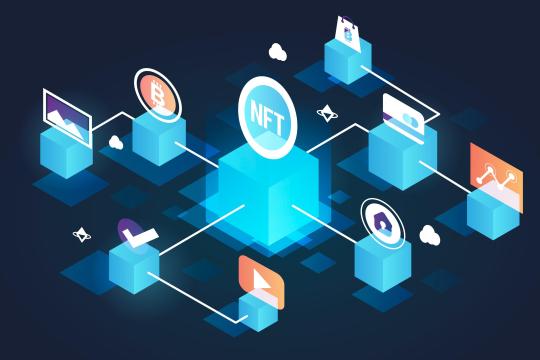
#BlockchainDevelopment#SmartContracts#DecentralizedApplications#BlockchainSecurity#BlockchainFrameworks
0 notes
Text
What is the Coolest Application of Blockchain Technology?
Explore various applications of blockchain technology across different industries for improved efficiency and transparency.
Blockchain technology has been a buzzword recently and has reshaped how we manage data, security, and transparency throughout business operations.
From fintech to healthcare and logistics, blockchain adoption is rising. To scale in the digital landscape, you must hire blockchain developers for better blockchain development services.
This blog highlights the 9 coolest uses of blockchain technology, reflecting its versatility, and potential to transform business operations and information security.
What is Blockchain Technology?

Blockchain is a decentralized, immutable ledger system that records transactions across the network. It ensures transparency, security, and trust without the need for intermediaries.
Core benefits-
Enhanced security through cryptographic encryption.
Decentralization eliminates single points of failure.
Transparency and immutability foster trust in transactions.
Efficiency gains from automated and streamlined processes.
Cost reduction by eliminating intermediaries and administrative overhead.
Build scalable Blockchain solutions with a blockchain development agency.
Increasing Popularity for Blockchain in 2024
Today, users are more aware that blockchain benefits are one of the top drivers of this technology. The adoption of blockchain has improved transparency and also simplified business processes.
Also, the growing popularity of blockchain as a service and low-cost ownership has driven the global blockchain market. Most businesses adopt blockchain for smart contracts, payments, and digital assets, offering potential growth opportunities.
Top brands like Adobe, Allianz, Baidu, etc use Blockchain Technology.
Do you know?
The global Blockchain market is estimated to rise 58.90% CAGR from 2016 to 2024.
Almost 3 out of 10 Organizations in the baking sector have used blockchain technology.
India Has The Highest Blockchain Adoption Rates Worldwide
Start your blockchain app development with top blockchain developers. From finance to non-finance, every sector is adopting blockchain technology.
Let us explore different applications of blockchain technology across industries.
Applications of Blockchain Technology
Smart Contracts
Smart contracts are self-executing agreements with en-coded terms. They automate and enforce contract execution without intermediaries, simplifying legal and financial transactions. Blockchain keeps them secure and immutable for various applications, from insurance payments to real estate transactions.
These contracts are set to execute automatically when the predefined conditions are met, minimizing fraud. Many companies are adopting smart contracts in their legal operations to improve efficiency, reduce costs, and transparency. Choose Blockchain smart contract development services with us.
Healthcare
The healthcare industry is evolving and blockchain has been one of the factors driving its advancement. Today, the entire healthcare value chain can implement blockchain, from reducing costs to improving business operations and making information accessible across stakeholders.
Blockchain technology applications not only help healthcare organizations but also help patients and consumers.
It also contributes to extensive clinical trials to collect and secure patient data.
It helps verify whether a patient has insurance and is covered.
The blockchain platform facilitates continuous communication between patients and doctors, supported by a seamless flow of medical data. This ensures swift and secure diagnoses by any medical professional, leveraging comprehensive medical histories.
Hire the best blockchain developers and blockchain development company in India.
Blockchain and IoT
The Internet of Things (IoT) has transformed the way people connect devices and communicate. Today, IoT has exposed networks and devices for hackers to steal your data.
With Blockchain-infused IoT, you will get a second layer of security that safeguards user data ensuring transparency.
Blockchain allows secure and decentralized sharing of IoT data to improve data integrity and privacy.
IoT devices execute transactions autonomously using smart contracts on the blockchain for seamless supply chain management and device payments.
With Blockchain, you can verify IoT devices' identity to prevent unauthorized access and enforce trusted interactions.
Look for Blockchain consulting for better IoT integrations.
Blockchain Cybersecurity
Do you know Crypto Users Lost $1.8 Billion In 2023 To Hacks And Scams? With blockchain, you can help safeguard data to the greatest extent.
Blockchain stores data decentrally, making it harder for hackers to alter information and protect against DDoS attacks.
It enables secure and verifiable identity management, helping to prevent identity theft and unauthorized access.
Blockchain keeps transaction records transparent and unchangeable so you can track and audit any security breaches.
Logistics
The shipping industry struggles with poor communication and transparency because of the many logistics companies involved. As per Accenture and DHL, over 500,000 shipping companies in the U.S. lead to data silos and transparency issues, suggesting blockchain as a cost-efficient solution that `can address these problems to improve logistics and supply chain management.
Blockchain can build greater trust within the industry.
Blockchain can make the logistics process leaner and more automated, saving millions of costs.
Enables multi-tier visibility across supply chain systems to detect issues easily.
NFTs
Non-fungible tokens (NFTs) are one of the top blockchain applications. These can be any digital items, like music, art, GIFs, and videos, sold on a blockchain, ensuring that only a sole owner has full rights. Due to blockchain technology, users can claim ownership over their digital assets.
Blockchain ensures NFTs are authentic and unique, preventing fraud.
It provides a clear ownership record for NFTs, making it easy to track digital assets.
With Blockchain, creators can get automatic royalty payments when the NFTs are resold.
Government
Blockchain applications reduce the need for centralized government organizations but intensify the conflict between governments and cryptocurrencies. Governments recognize the potential of blockchain technology and are actively seeking ways to enhance operational processes using blockchain services. Many governments have already implemented blockchain for various purposes.
For example- Venezuela and Russia have launched their national cryptocurrencies to improve transparency and reduce corruption. Blockchain technology can create immutable voting systems, reducing fraud and fostering honest elections. It can improve identity management and tax administration for more reliable systems.
Social Media
Social media platforms have dominated our lives but come with potential issues like data breaches and poor user compensation. It's fair to say social media is losing its credibility.
Blockchain is set to transform social media by improving these platforms.
With its decentralized and distributed ledger structure, blockchain protects user’s personal information and potentially earns rewards from the content they select and share. Blockchain technology can significantly improve traditional social media.
Artificial Intelligence
Decentralizing AI can create Decentralized Autonomous Organizations (DAOs), businesses that operate independently using smart contracts, without centralized control.
An AI-powered DAO can learn from data and optimize itself more efficiently than human design. Combining blockchain and AI, or "decentralized AI," could revolutionize data security, monetization, and intelligent algorithms.
Blockchain applications are not limited to these industries mentioned above. Once you tap into a new industry, you will find scenarios for blockchain integration to improve and secure the process.
[Also Read- How Much Does Blockchain App Development Cost: A Detailed Overview]
Build Secure Blockchain Apps with OnGraph
In today's digital landscape, embracing decentralized technology like blockchain is essential. It's revolutionizing transactions, data management, and supply chains, enhancing security, traceability, and operational efficiency.
As a leading Blockchain Development Company in the USA, OnGraph provides a blockchain development team to deliver customized solutions for your Blockchain requirements. With our team of expert web app developers, we offer a range of services, from building secure decentralized applications (dApps) to seamless blockchain integration solutions.
#Blockchaintechnology#Decentralizedapplications#Smartcontracts#Blockchaindevelopment#Cryptocurrencyapplications#Blockchainsecurity#Blockchainplatforms#Blockchainforfinance#Blockchaininhealthcare#Blockchainforsupplychain#BlockchainforIoT#Enterpriseblockchain#Blockchainintegration#Publicblockchain#Privateblockchain
0 notes
Text
ALGO Investment Strategy: Becoming a Millionaire
Despite the recent impressive growth of the crypto market, the native token of the high-performance blockchain platform Algorand, known as ALGO, still trades at a significant 95.2% below its historical peak reached in June 2019. Understanding ALGO: Algorand operates on its proprietary Pure Proof-of-Stake (PPoS) consensus algorithm and supports smart contracts, decentralized applications, and the issuance of digital assets. The network is positioned as "carbon-negative," with a portion of transaction fees allocated to various initiatives for offsetting CO2 emissions. The governance token ALGO is utilized for staking, fee payments, and node deployment, with a maximum supply of 10 billion coins. Current Status and Market Position: As of the time of writing, ALGO ranks 58th in the top 100 cryptocurrencies by market capitalization, with a market cap of $1.38 billion. Calculating ALGO Holdings for Millionaire Status: To calculate the number of tokens needed to become a millionaire when ALGO returns to its historical peak, one can use the following formula: Number of tokens = Target amount / Expected future price, Where: - Target amount = $1 million - Expected future price = historical maximum of $3.56 Based on this, approximately 280,898 tokens would be required to reach a balance of $1 million. At the current price of $0.1721 per token, the total cost of acquiring these tokens would be $48,370. Risk Considerations: It's important to recognize the inherent volatility of the crypto market and its susceptibility to "black swan" events. The calculations provided are based solely on current data and assumptions. Always remember to adhere to risk and money management principles and only trade with funds you can afford to lose. Read the full article
#ALGO#Algorand#blockchainplatform#carbon-negative#CryptocurrencyInvestment#decentralizedapplications#DigitalAssets#MarketCapitalization#PPoS#PureProof-of-Stake#smartcontracts#staking
0 notes
Text
MicroVisionChain Marks First Anniversary
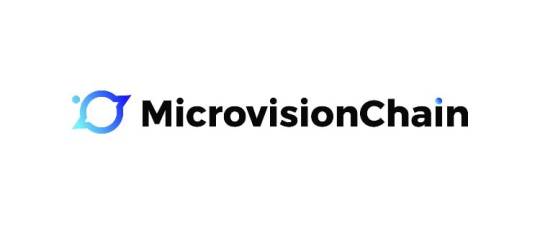
A Trailblazing Year in Blockchain Innovation
MicroVisionChain Anniversary: Celebrating Success MicroVisionChain (MVC), a beacon of high performance on Bitcoin's Layer 2, commemorates its first anniversary with significant milestones that have set new standards in the blockchain domain. Launched with the ethos of fairness and community-driven progress, MVC has not only excelled in technical advancements but also in fostering a robust ecosystem around its native coin, SPACE. SPACE Coin Listing: A New Era of Mining The listing of SPACE on F2pool marks a pivotal moment, acknowledging MVC's growing influence in the crypto mining landscape. SPACE's integration into one of the leading mining pools underscores the chain's high hash rate and the adoption of Bitcoin ASICs for mining, showcasing the seamless convergence of traditional and innovative crypto-mining methodologies. F2pool Crypto Mining: Expanding Horizons F2pool's endorsement brings SPACE to a wider audience, offering miners a lucrative opportunity to engage with one of the most promising PoW chains. This collaboration signifies a mutual recognition of value and potential, further elevating MicroVisionChain's stature within the global crypto community. Bitcoin Layer 2 Chain: Enhancing Bitcoin's Ecosystem MVC's year has been marked by breakthroughs such as the UTXO layer 1 Turing complete Smart Contract and the innovative Bitcoin Virtual Machine (BVM). These developments not only enhance the functionality of Bitcoin's ecosystem but also introduce revolutionary concepts like the MVC-20 free-mint protocol and on-chain DAO voting, enriching the blockchain landscape. MVC Ecosystem Achievements: Driving Community Innovation The MVC ecosystem has seen a flurry of activity with the launch of decentralized applications and services such as Mvcswap, MVCbridge, and Show3, a decentralized discord with an NFT Market. These achievements highlight MVC's commitment to creating a versatile and user-friendly platform that caters to a wide range of blockchain applications and services. Blockchain Technology Development: Looking Forward As MicroVisionChain enters its second year, the focus shifts to "Building Together" – a program designed to foster innovation and collaboration within the MVC community. This initiative will not only support existing projects but also encourage new contributions, ensuring the continuous growth and evolution of the MVC ecosystem. Crypto Community Growth: A Unified Vision The past year's success stands as a testament to the strength and dedication of the MVC community. Every member, from miners to developers and users, has played a crucial role in shaping the chain's trajectory. Moreover, the upcoming Builder Grant Program is a clear reflection of MVC's commitment to its community, as it offers support and resources to those who actively contribute to its expansion. Decentralized Applications: The Future of MVC The development and integration of decentralized applications remain a core focus for MVC. With an eye on innovation, MVC aims to introduce more applications that leverage its high-performance blockchain, offering solutions that meet the demands of a rapidly evolving digital world. High-Performance Blockchain: Setting New Benchmarks MicroVisionChain's journey is marked by its unwavering pursuit of excellence. With achievements like lightning-fast transactions and minimal gas fees, MVC is not just setting benchmarks for performance but also for accessibility, making blockchain technology more attainable for users worldwide. Crypto Mining Innovations: Pioneering Change The collaboration with F2pool, in addition to the continued growth in hash rate, serves as clear indicators of MVC's pioneering spirit in the field of crypto mining. Furthermore, by adopting innovative approaches and actively fostering partnerships, MVC is poised to lead the way in making crypto mining not only more efficient but also more environmentally friendly. In Conclusion MicroVisionChain's first anniversary is not just a celebration of past achievements but also a beacon for future innovation. With a strong foundation and a clear vision, MVC will continue to revolutionize the blockchain space, drive forward the development of decentralized technologies, and nurture a vibrant community of enthusiasts and innovators. Sources: THX News & MicroVisionChain. Read the full article
#BitcoinLayer2Chain#BlockchainTechnologyDevelopment#CryptoCommunityGrowth#CryptoMiningInnovations#DecentralizedApplications#F2poolCryptoMining#High-PerformanceBlockchain#MicroVisionChainAnniversary#MVCEcosystemAchievements#SPACECoinListing
0 notes
Text
Diving into decentralized finance (DeFi): Revolutionizing traditional banking

With the introduction of decentralized finance (DeFi), the financial environment has experienced tremendous upheaval recently. DeFi is an innovative movement that uses blockchain technology to provide a rival to conventional financial institutions. DeFi creates new avenues for financial inclusion, transparency, and innovation by getting rid of middlemen and centralized agencies. This article delves deep into the realm of DeFi, examining its fundamental tenets, advantages, and potential to transform conventional banking as we currently know it.
I. Understanding DeFi
A collection of financial services and apps created on blockchain networks like Ethereum is referred to as "decentralized finance," or "DeFi." DeFi solutions work without centralized management, in contrast to traditional financial systems, allowing peer-to-peer exchanges and interactions. Lending, borrowing, trading, and yield cultivation are just a few of the many financial operations that can be automated thanks to smart contracts, which are self-executing sections of code. Users now have more freedom and control over their money because of this.
Decentralized exchanges (DEX), lending platforms, stablecoins, asset management protocols, and more fall under the umbrella of DeFi. Each of these applications is made to function without the use of middlemen, relying instead on the security and transparency of the blockchain to uphold participant confidence.
II. Fundamentals of DeFi
a. Decentralization
Decentralized networks, on which DeFi systems are built, ensure that no one organization has complete control over the system. This lessens the possibility of censorship or manipulation. Greater resilience is another benefit of decentralization because there is no one point of failure.
b. Open source
The majority of DeFi protocols allow anybody to view the source code, suggest changes, or create new applications, encouraging community creativity. The DeFi ecosystem benefits from openness, trust, and cooperation fostered by this open strategy.
c. Interoperability
DeFi projects can communicate with one another using smart contracts, resulting in a seamless environment that is interconnected. Users can access a variety of DeFi services thanks to this interoperability without switching platforms or juggling various credentials.
d. Transparency
Since blockchain transactions are visible and openly verifiable, they foster user confidence and lower the likelihood of fraud. Each transaction can be examined by participants to make sure the protocol is operating as planned.
III. Advantages of DeFi:
a. Financial inclusion
DeFi eliminates the requirement for traditional banking infrastructure, allowing individuals with restricted bank access to engage in a range of financial activities with just a smartphone and an Internet connection. DeFi can be a lifeline for consumers looking for basic financial services in places where banking services are expensive or infrequent.
b. Lower barriers
DeFi platforms typically feature reduced entry barriers, making it possible for anybody to lend, borrow, trade, or invest without having to go through a lengthy approval process. Individuals may manage their finances and take part in the global economy because of this inclusion.
c. Global accessibility
DeFi runs on a network with no physical borders, allowing users to conduct financial transactions from anywhere in the world. This accessibility on a global scale encourages new levels of financial inclusion and cooperation.
d. Enhanced security
Compared to conventional banking systems, DeFi lowers the danger of fraud and piracy due to cryptographic security mechanisms used in blockchain technology. Smart contracts eliminate human mistakes and potential manipulation by running exactly as intended.
e. Opportunities for earning returns
Users can engage in profitable activities like yield farming and liquidity provision, which frequently provide returns that are larger than those of conventional savings accounts. The open and competitive nature of DeFi may inspire new strategies for making passive income.
IV. Challenges and risks
a. Security vulnerabilities
Although blockchain technology is thought to be secure, smart contract faults and vulnerabilities have in the past resulted in large financial losses. In-depth security audits and assessments must be performed on DeFi protocols to reduce risks and safeguard user payments.
b. Regulation and compliance
Because DeFi is decentralized, it can be difficult to comply with regulations, which could cause problems with conventional financial systems. DeFi's long-term success depends on finding a compromise between regulatory compliance and upholding its fundamental beliefs.
c. Scalability
Due to the present constraints of blockchain networks, DeFi platforms may not be as effective or scalable, which could result in increased transaction costs during busy times. To solve these problems, Layer 2 scaling and advancements in blockchain technology are being investigated.
d. User experience
For non-technical users, DeFi platforms might be daunting and difficult. For adoption to become widespread, user experience must be enhanced and user interfaces must be made more approachable.
V. Traditional banking and DeFi
a. Disintermediation
By doing away with middlemen like banks and financial organizations, DeFi lowers costs and boosts the effectiveness of financial transactions. Smart contracts allow for direct user interaction, doing away with middlemen and their related expenses.
b. Cross-border payments:
Due to DeFi's borderless nature, cross-border payments and fund transfers are simple and quick without the use of intermediaries or currency changes. This can considerably lower the price and duration of international transfers.
c. Financial services access
DeFi can give underbanked and unbanked populations access to financial services, promoting greater financial inclusion. People who live in remote locations can use DeFi applications because all they need is an internet connection and a digital wallet.
d. Finance that can be programmed
DeFi's programmability enables the development of high-end financial goods and services. Smart contracts enable users to customize financial strategies, automate investment choices, and carry out complicated transactions.
CONCLUSION
Decentralized finance (DeFi) is a force for disruption in the financial sector, upending conventional banking practices and providing a viable future alternative. The way individuals interact with money, assets, and financial services is going to undergo a radical change as decentralized finance advances and gains popularity.
To fully utilize DeFi's potential to improve traditional banking, it is crucial to find a balance between innovation and security while navigating the regulatory environment. DeFi can transform the global financial environment and provide people with unmatched access to a wide range of financial opportunities by encouraging financial inclusion, transparency, and autonomy. Collaboration between the crypto community, authorities, and established financial institutions will be essential to building a peaceful and successful future for decentralized finance as we advance in the field of DeFi.
If you're interested in learning more, you can check out my recommended “Course of Crypto and Bitcoin”
"Disclosure: This article includes affiliate links. If you click on these links and make a purchase, I may earn a commission at no additional cost to you. I only recommend products or services that I have personally used and believe will add value to my readers. Your support through these affiliate links is greatly appreciated and helps me continue to provide valuable content on mastercryptoforall.blogspot.com. Thank you!"
#DeFiRevolution#DecentralizedFinance#CryptoDisruption#BlockchainInnovation#FinancialInclusion#SmartContracts#DeFiAdvantages#CryptoInnovation#DeFiChallenges#FinancialRevolution#DeFiSolutions#DeFiPlatforms#CryptoLending#DecentralizedApplications#CryptoInvesting#Decentralization#BlockchainTech
0 notes
Link
In an ever-evolving digital landscape, J.Bee.com stands out as a revolutionary platform that embodies the true potential of Web3 technology. But what exactly is J.Bee.com, and why should you care? Let’s delve into what makes this platform a game-changer and explore the myriad benefits of its solid project foundation.
What is J.Bee.com?
J.Bee.com is a leading Web3 portal dedicated to integrating GameFi, SocialFi, and various decentralized applications to create a comprehensive ecosystem for users and developers alike [1]. This platform leverages blockchain technology to offer secure, decentralized, and transparent solutions, making it a hub for innovation and collaboration in the Web3 space.
Benefits of a Solid Project at J.Bee.com
Decentralization: At its core, J.Bee.com operates on the principles of decentralization, ensuring that no single entity has control over the network. This fosters a trustless environment where users can interact and transact without intermediaries, enhancing security and transparency [3].
Collaborative Ecosystem: The Bee Network, as highlighted in its white paper, functions like a hive, where every participant's contribution is crucial. This collaborative approach not only drives innovation but also ensures that the network continually evolves and improves [4].
Engagement and Education: By bringing together a variety of Web3 applications, J.Bee.com engages users in new and exciting ways. Whether through GameFi, which combines gaming and finance, or SocialFi, which integrates social networks with decentralized finance, the platform offers numerous opportunities for learning and growth [1].
Growth Services: J.Bee.com is dedicated to helping Web3 projects worldwide achieve their growth potential. By providing a robust platform for interaction and development, it supports projects from inception to execution, ensuring they reach their target audience and succeed in the competitive Web3 market [6].
Innovative Solutions: The platform's focus on integrating the latest technologies and trends in the blockchain space ensures that users always have access to cutting-edge solutions. This commitment to innovation keeps the community engaged and constantly pushing the boundaries of what’s possible [1].
Joining Bee.com means being part of a vibrant, forward-thinking community that values collaboration, innovation, and growth. Don’t miss out on the opportunity to be at the forefront of the Web3 revolution. Join J.Bee.com today and experience the future of decentralized technology!
0 notes
Text
Web3 and Censorship Resistance
https://supedium.com/cryptocurrency-and-web3/web3-and-censorship-resistance/ #blockchain #censorshipresistance #decentralizedapplications #digitalrights #freespeech #Web3 Web3 and Censorship Resistance https://supedium.com/cryptocurrency-and-web3/web3-and-censorship-resistance/
0 notes
Text
What is Toncoin? A Complete Guide to How Toncoin Works

Understanding Toncoin: How It Functions and Its Potential in the Crypto World Toncoin, a native cryptocurrency of the TON (The Open Network) blockchain, is rapidly gaining attention within the crypto world. But what exactly is Toncoin, and how does it work? In this article, we’ll explore the essential details about Toncoin, its origin, its purpose, and how it functions within the TON blockchain.

What is Toncoin? Toncoin is a cryptocurrency created to promote the TONNE blockchain ecosystem. TONNE, which was originally developed by Telegram, promises to establish a decentralised network capable of handling billions of users while also providing services such as instant messaging, decentralised file storage, and even financial solutions. Toncoin is the native token on this network, which powers the blockchain's decentralised apps (dApps), transactions, and services. Also Read: four-meme-suffers-malicious-attack-resulting-in-183k-loss Toncoin's Origin: Toncoin's tale began with Telegram, a popular chat app. Telegram's founders envisioned building a blockchain that could scale in the same manner that the internet did, enabling decentralised applications and establishing a new digital economy. In 2018, Telegram began developing the TONNE blockchain, with Gramme serving as the initial cryptocurrency. However, due to regulatory issues, Telegram had to abandon the initiative. Despite Telegram's leaving in 2020, the TONNE community continued to build the TONNE blockchain, resulting in the establishment of Toncoin. The open-source community took over the blockchain's development, ensuring that it remained true to its original aim and vision. How does Toncoin work? Toncoin uses the TONNE blockchain, which is designed to provide users with scalability, speed, and security. It has a multi-chain architecture that allows for parallel processing, resulting in better transaction throughput than many other blockchains. Toncoin tokens are used to pay transaction fees, execute smart contracts, and engage in network governance processes. Toncoin uses a proof-of-stake (PoS) consensus process, which means Toncoin holders can stake their coins to help protect the network and gain rewards. This approach makes the network more energy-efficient than other blockchains, which use energy-intensive proof-of-work models. Benefits of Toncoin: Scalability is one of Toncoin's notable features. TON's multi-chain architecture allows it to process thousands of transactions per second, making it suitable for mass adoption. Toncoin transaction fees are extremely low when compared to many other cryptocurrencies, making it suitable for modest transactions. Toncoin benefits from Telegram's original emphasis on privacy, which places a high value on secure and private transactions inside the ecosystem. Toncoin supports a wide range of decentralised applications (dApps) that run on the TONNE blockchain. These apps include finance solutions, social media platforms, and storage services, all of which run on Toncoin. Toncoin holders can also engage in governance processes, which help decide on protocol upgrades, enhancements, and the network's overall direction. Future of Toncoin: Toncoin's future looks bright. With the TONNE community moving forward, the coin has the potential to become a major participant in the blockchain ecosystem. Toncoin's connection with Telegram's massive user base has enormous prospects for adoption, particularly in places where blockchain technology and cryptocurrency are gaining momentum. As blockchain use grows, Toncoin might play a key role in providing a decentralised internet with faster and cheaper transactions. Toncoin is well-positioned to grow and expand its footprint in the coming years, thanks to its robust community and increased interest in privacy-focused solutions. Conclusion: Toncoin is a cryptocurrency that is set to transform the blockchain world. Toncoin's focus on scalability, cheap transaction fees, and decentralised governance positions it to play an important role in the future of decentralised apps. Toncoin is expected to gain traction as the TONNE network expands and matures as a valuable asset for blockchain enthusiasts and users seeking privacy, security, and efficiency. Read the full article
#blockchaintechnology#cryptonews#cryptocurrency#DecentralizedApplications#howToncoinworks#Telegram#TONblockchain#Toncoin#Toncoinfuture#Toncoinusecases
0 notes
Text
TechZino is a leading blockchain development agency specializing in building secure, scalable, and innovative blockchain solutions. Our team of experienced blockchain developers leverages cutting-edge technologies to create decentralized applications (DApps), smart contracts, and blockchain platforms tailored to meet your unique business needs. Whether you're looking to integrate blockchain into your existing systems or develop a new blockchain-based product from the ground up, TechZino offers expertise in various blockchain networks, including Ethereum, Binance Smart Chain, and Hyperledger. Partner with us to revolutionize your business with the power of blockchain technology
#TechZino#BlockchainDevelopment#BlockchainSolutions#DAppDevelopment#SmartContracts#DecentralizedApplications#BlockchainTechnology#BlockchainAgency#CryptoSolutions#BlockchainExperts#EthereumDevelopment#BinanceSmartChain#Hyperledger#BlockchainInnovation#TechSolutions#BlockchainConsulting#BlockchainPlatform#TechCompany#BlockchainForBusiness#DigitalTransformation#Web3Development
0 notes
Video
youtube
The Ultimate Crypto Carnival: 50.000 $A8 Tokens Up for Grabs on BingX!
#cryptoexchange #cryptocarnival #bingX #A8token #prizepool #tradingvolume #referralcode #perks #benefits #marketcap #tradingvolume #layer1blockchain #fast #scalable #secure #decentralizedapplications #DeFiplatforms #NFTmarketplaces #Web3 #decentralization #userowneddata #gamechanger #insidertips #exclusivedeals #surprises #cryptocarnival
#youtube#cryptoexchange#cryptocarnival#bingx#bingxcopytrade#a8token#prizepool#tradingvolume#trading volume#referralcode#referral code
0 notes
Text
Smart Contracts
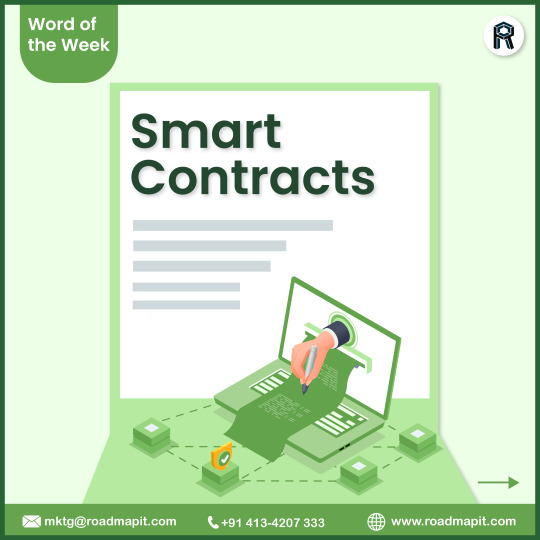
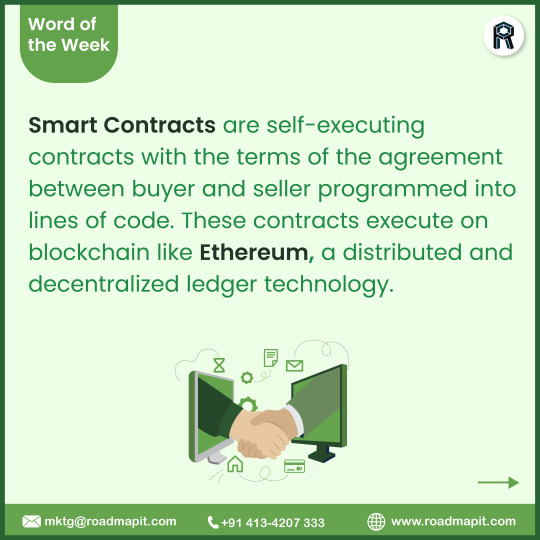
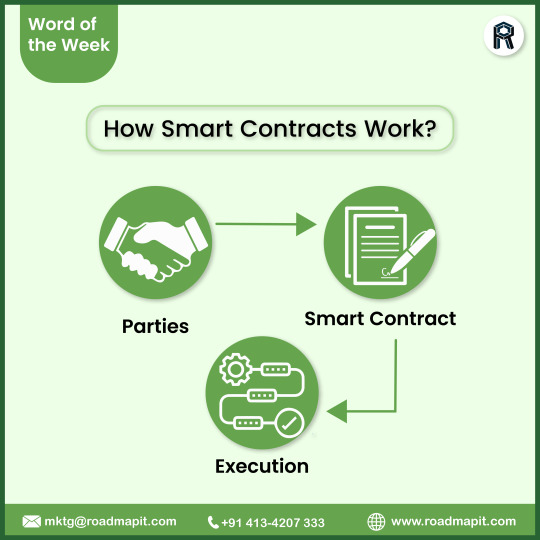
Smart contracts are written in programming languages like Solidity, which are self-executing pieces of computer code that can facilitate, verify, and enforce the performance of an agreement. But unlike regular computer programs, these digital smart contracts are trustless, autonomous, transparent, and immutable.
Smart contracts have the potential to revolutionize various industries by automating trust and contract execution securely and transparently. This makes them useful for many kinds of commercial and legal applications.
#SmartContracts#Ethereum#Blockchain#smartcontractsdevelopment #smartcontracter#decentralizedapplications#dApps#blockchaintechnology#finance#crytocurrencies#agreement#automation#programmingcode#Solidity#Roadmapitsolutions#itservices#erpsoftware#erp#roadmaperp#wordoftheweek
#smartcontracts#smartcontracter#decentralized applications#automation#erpsoftware#roadmaperp#word of the week#it services
0 notes
Text

Our team of blockchain developers can help you create secure, scalable, and decentralized applications that transform the way you do business.
Contact us today to learn more about our blockchain development services! 💼💡 🚀 👉 www.amigoways.com/contact-us
#Blockchain#BlockchainTechnology#BlockchainBusinessDevelopment#DecentralizedApplications#Crypto#Cryptocurrency#DigitalTransformation#BlockchainSuccessStories#BusinessGrowthInBlockchain#BusinessTransformationInBlockchain#BlockchainConsultingServices#LetsConnects#BlockchainSolutions#BlockchainInnovation#BlockchainStrategy
2 notes
·
View notes